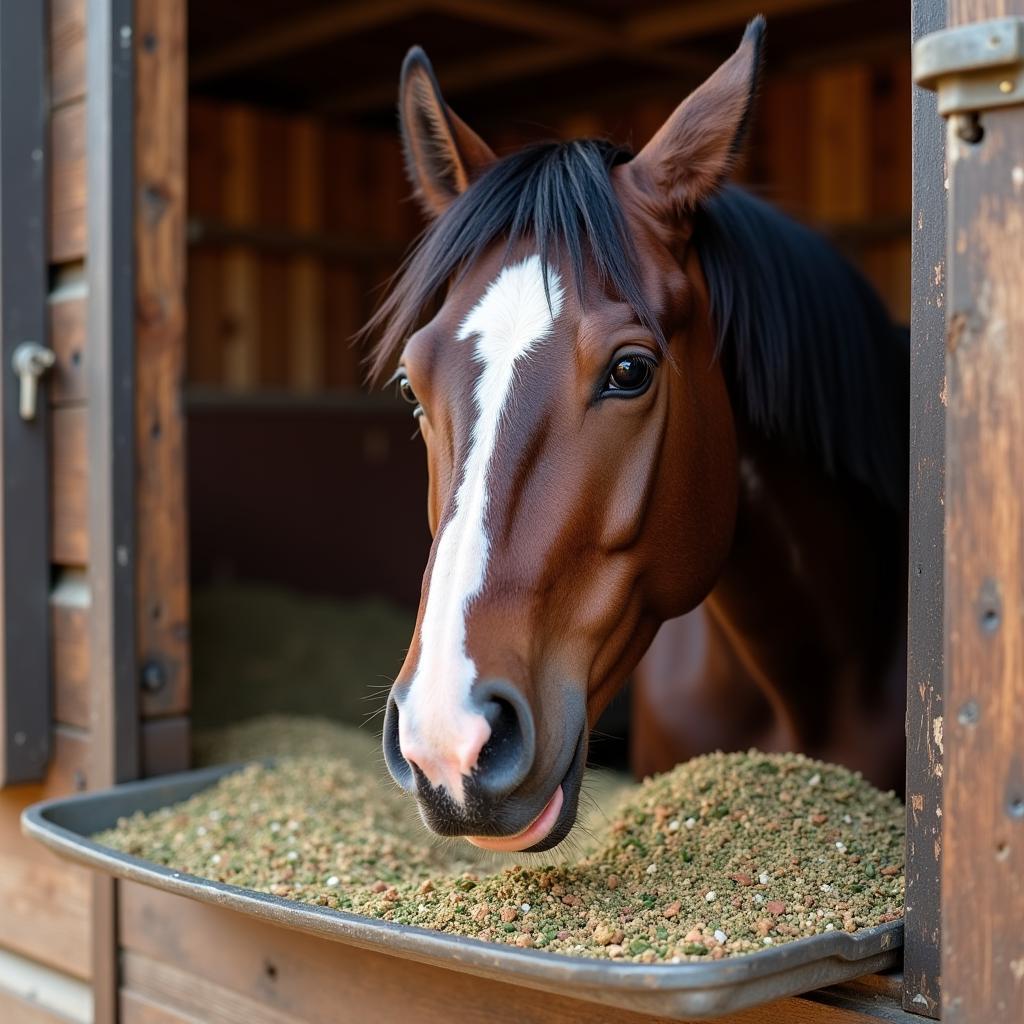Enriching your horse feed is a crucial aspect of equine care, ensuring your horse receives the optimal nutrition it needs for peak performance and overall well-being. This guide will delve into the intricacies of enriching horse feed, covering everything from understanding your horse’s nutritional needs to selecting the right supplements and creating a balanced diet. We’ll explore the benefits of enriched feed and offer practical advice to help you make informed decisions about your horse’s dietary requirements.
Why Enrich Horse Feed?
A horse’s basic diet of hay or pasture may not always provide all the essential vitamins and minerals they require, especially if the forage quality is poor or the horse has specific dietary needs. Enriching horse feed helps to fill these nutritional gaps, ensuring your horse receives a balanced diet that supports:
- Optimal growth and development: Young horses need specific nutrients for healthy bone and muscle development. Enriched feed can provide these crucial building blocks.
- Enhanced performance: Whether your horse is a competitive athlete or a leisure companion, enriched feed can improve stamina, strength, and overall performance.
- Improved coat and hoof condition: A shiny coat and strong hooves are indicators of good health. Enriched feed can contribute to both.
- Stronger immune system: A balanced diet with adequate vitamins and minerals supports a healthy immune system, helping your horse ward off illness.
- Improved digestion: Certain feed additives can promote healthy gut function and improve digestion, especially in horses with sensitive stomachs.
Choosing the Right Supplements to Enrich Horse Feed
Selecting the right supplements depends on several factors, including your horse’s age, activity level, and overall health. Always consult with your veterinarian or an equine nutritionist before adding supplements to your horse’s diet. Some common supplements used to Enrich Horse Feed include:
- Vitamins and minerals: These are essential for various bodily functions and may need to be supplemented if lacking in the base diet. Common examples include vitamin E, selenium, and biotin.
- Protein supplements: Horses with high energy requirements, such as performance horses or lactating mares, may benefit from added protein in their feed.
- Fat supplements: Fats are a concentrated energy source and can be beneficial for horses needing to gain weight or improve their stamina.
- Fiber supplements: Adding fiber can help regulate digestion and prevent digestive upset, especially in horses prone to colic.
- Joint supplements: These can support joint health and mobility, particularly in older horses or those with existing joint issues. You can find excellent oxy gen horse products for joint support and other health needs.
Creating a Balanced Diet for Your Horse
Enriching your horse feed isn’t just about adding supplements. It’s about creating a balanced diet that meets all of your horse’s nutritional needs. Consider the following:
- Forage: High-quality hay or pasture should form the foundation of your horse’s diet.
- Concentrates: Grain or commercially prepared feed can be added to provide extra calories and nutrients. You may want to explore options like Purina Enrich Plus horse feed for a balanced and complete feed.
- Supplements: Use supplements strategically to address specific deficiencies or support particular needs. For example, Enrich Plus horse feed can be further enriched with targeted supplements if necessary.
- Water: Fresh, clean water should always be available.
How Much Should I Enrich My Horse Feed?
The amount of enrichment needed will vary depending on the individual horse. Factors to consider include:
- Age: Growing horses and senior horses have different nutritional needs compared to adult horses.
- Activity level: Performance horses require more calories and nutrients than leisure horses.
- Health status: Horses with certain health conditions may benefit from specific dietary modifications.
“Remember,” says Dr. Emily Carter, DVM, Equine Nutrition Specialist, “over-supplementing can be just as harmful as under-supplementing. Always follow the manufacturer’s instructions and consult with a professional for personalized advice.”
 Horse Eating Enriched Feed
Horse Eating Enriched Feed
Conclusion
Enriching horse feed is a vital part of responsible horse ownership. By understanding your horse’s individual needs and choosing the right supplements, you can create a balanced diet that supports optimal health, performance, and well-being. Remember to always consult with a veterinarian or equine nutritionist for personalized guidance. Enriching your horse’s feed is an investment in their long-term health and happiness. If you’re looking for a new equine companion to care for, you might even consider a horse for sale under 1000.
FAQs
- What are the signs of a nutritional deficiency in horses? Signs can include a dull coat, weight loss, poor hoof quality, and decreased performance.
- Can I enrich my horse feed with homemade supplements? It’s best to use commercially prepared supplements to ensure proper balance and avoid potential toxicity.
- How often should I re-evaluate my horse’s feed program? At least annually, or more frequently if your horse’s needs change.
- What’s the best way to introduce new supplements to my horse’s diet? Gradually, over several days, to avoid digestive upset.
- Where can I buy high-quality horse feed supplements? You can find reputable brands at feed stores, online retailers, and sometimes at locations like 100 East White Horse Pike.
- Is it necessary to enrich horse feed if they have access to good pasture? Even with good pasture, supplementation might be necessary depending on the individual horse’s needs and the nutrient content of the pasture.
- Can enriching horse feed help with specific health problems? Yes, targeted supplementation can support horses with certain health conditions, but always consult with a veterinarian.
Need more help? Contact us at Phone: 0772127271, Email: [email protected] or visit us at QGM2+WX2, Vị Trung, Vị Thuỷ, Hậu Giang, Việt Nam. We have a 24/7 customer support team.